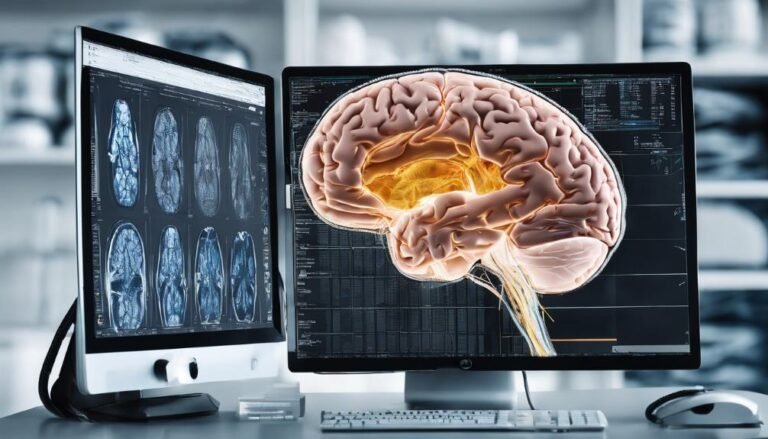AI in Telemedicine
In the field of telemedicine, AI plays a pivotal role in reshaping healthcare delivery. Imagine a scenario where patient care becomes more efficient, diagnoses are more accurate, and treatments are tailored to individual needs. The integration of artificial intelligence in telemedicine is not just about technology but about transforming the way healthcare is provided. The potential benefits are vast, impacting not only patients but also healthcare providers. The question remains: how exactly does AI revolutionize telemedicine, and what implications does it have for the future of healthcare?
Key Takeaways
- AI revolutionizes telemedicine with virtual appointments for convenience and thorough assessments.
- Remote consultations offer accurate diagnoses and personalized treatment plans.
- Real-time monitoring with wearable tech provides essential health data for early trend detection.
- AI aids in disease diagnosis with rapid, accurate analysis of complex medical data.
- Healthcare access is improved through AI-driven solutions, enhancing patient outcomes with personalized care plans.
Remote Consultations
Moreover, substantially employing artificial intelligence in telemedicine has revolutionized remote consultations, streamlining the process for efficient and effective patient care. Virtual appointments have become a cornerstone of telehealth benefits, offering patients the convenience of consulting with healthcare providers from the comfort of their homes. Through AI-powered platforms, healthcare professionals can now conduct thorough assessments, provide accurate diagnoses, and develop personalized treatment plans remotely.
The integration of AI algorithms in telemedicine has greatly enhanced the quality of virtual appointments. By analyzing patient data in real-time, AI systems can assist healthcare providers in making informed decisions promptly. This not only reduces the time taken to diagnose medical conditions but also minimizes the risk of errors in treatment plans.
Moreover, AI-driven telemedicine solutions offer a level of accessibility that was previously unattainable, particularly benefiting patients in rural areas or those with mobility issues.
Real-time Monitoring
Real-time monitoring plays a pivotal role in enhancing patient care by providing healthcare providers with immediate and continuous access to essential data and metrics.
Wearable technology equipped with sensors enables the collection of real-time health information, offering insights into a patient's crucial signs, activity levels, and overall well-being.
Through data analytics, this information can be processed and analyzed swiftly, allowing for early detection of any concerning trends or anomalies.
Disease Diagnosis Assistance
AI technology plays a crucial role in diagnosing diseases due to its ability to efficiently analyze complex medical data and patterns. One significant benefit of using AI in disease diagnosis is its high accuracy in interpreting vast amounts of information swiftly. AI algorithms can process medical data with precision, resulting in more accurate diagnoses compared to traditional methods. This enhanced accuracy enables healthcare providers to make better-informed decisions regarding patient care and treatment plans.
Moreover, AI provides rapid response times in diagnosing diseases, which is crucial in urgent medical situations where timely intervention is essential. By swiftly analyzing symptoms, test results, and patient history, AI systems can assist healthcare professionals in promptly reaching a diagnosis. This rapid response can lead to faster treatment initiation, potentially enhancing patient outcomes and reducing the progression of diseases.
Healthcare Access Improvement
To enhance healthcare access, advancements in AI technology facilitate streamlined patient triaging and resource allocation, improving the efficiency of medical services delivery.
Telehealth expansion supported by AI enables healthcare providers to reach a broader patient population, bridging the gap created by the digital divide. By leveraging telemedicine benefits, especially in rural communities where access to healthcare services is limited, AI plays an important role in improving overall healthcare access.
In rural areas, where healthcare facilities are scarce, AI-driven telemedicine solutions connect patients with healthcare professionals remotely, reducing the need for in-person visits and overcoming geographical barriers.
This not only enhances access to healthcare services but also guarantees timely interventions and preventive care for individuals in underserved regions.
Patient Outcome Enhancement
Enhancing patient outcomes through the integration of AI technology in telemedicine involves optimizing treatment plans and monitoring patient progress remotely. Treatment optimization with AI algorithms allows for personalized care plans based on individual patient data, leading to more effective interventions and improved outcomes.
AI can analyze vast amounts of patient information in real-time, assisting healthcare providers in making data-driven decisions to enhance treatment efficacy.
Moreover, AI in telemedicine provides essential recovery support by offering continuous monitoring and timely interventions. Through remote patient monitoring enabled by AI, healthcare teams can track progress, identify potential complications early, and adjust treatment regimens accordingly.
This proactive approach facilitates better recovery management, reduces hospital readmissions, and ultimately enhances patient outcomes.
Conclusion
To sum up, AI in telemedicine offers a glimpse into the future of healthcare, providing remote consultations, real-time monitoring, and accurate disease diagnosis assistance.
This technology has truly transformed the way healthcare is delivered, improving access to care and enhancing patient outcomes.
With AI by your side, the possibilities for personalized and efficient healthcare delivery are endless, making the once unimaginable a reality in today's digital age.







